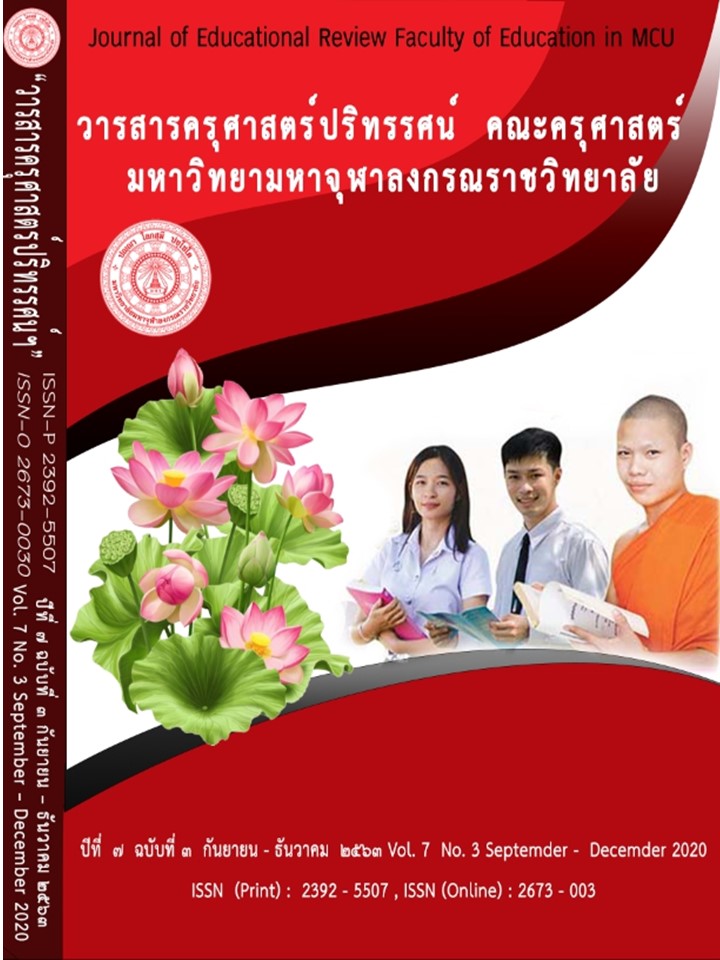INNOVATION ENCOURAGING ENVIRONMENTAL LEARNING MANAGEMENT FOR PRIMARY SCHOOL STUDENTS UNDER BANGKOK METROPOLITAN ADMINISTRATION
Main Article Content
Abstract
This research paper aimed to propose innovation encouraging environmental learning management for primary school students under Bangkok Metropolitan Administration. Mixed methods research was designed and was divided into 3 steps. Step 1: Study environment learning management. The questionnaire was used by 390 administrators and teachers, and data were analyzed by using descriptive statistics consisted of frequency, percentage, mean and standard deviation. Step 2: develop innovation by interviewing 24 key informants with interview form, and data was analyzed by content analysis. Step 3: propose innovation encouraging environmental learning management by focus group discussion of 10 experts with questions for focus group discussion, and data was analyzed by content analysis. Research results found that innovation encouraging environmental learning management for primary school students under Bangkok Metropolitan Administration consisted of 4 components: 1) principles, 2) purpose, 3) operational methods, and 4) process. It was an action to develop educational innovations that encouraged learning management. These learning management innovations can emphasize the process of learning management within educational institutions in 5 areas: (1) innovation in teaching and learning, (2) innovation in teaching and learning methods, (3) innovation in curriculum, (4) measurement and evaluation Innovation, (5) management innovation by integrating with the environment that encouraged innovation in learning management in 3 areas which were physical within the school, society within the school, and teaching and instruction.
Article Details
ทัศนะและความคิดเห็นที่ปรากฏในบทความในวารสารฉบับนี้ถือเป็นความรับผิดชอบของผู้เขียนบทความนั้นเพียงผู้เดียว และไม่ถือเป็นทัศนะและความรับผิดชอบของกองบรรณาธิการ
กองบรรณาธิการขอสงวนสิทธิ์ในการคัดเลือกบทความลงตีพิมพ์และจะแจ้งให้เจ้าของบทความทราบหลังจากผู้ประเมินบทความตรวจอ่านบทความแล้ว
ต้นฉบับที่ได้รับการตีพิมพ์ในวารสารครุศาสตร์ปริทรรศน์ คณะครุศาสตร์ มหาวิทยาลัยมหาจุฬาลงกรณราชวิทยาลัย ถือเป็นกรรมสิทธิ์ของคณะครุศาสตร์ มหาวิทยาลัยมหาจุฬาลงกรณราชวิทยาลัย ห้ามนำข้อความทั้งหมดหรือบางส่วนไปพิมพ์ซ้ำ เว้นเสียแต่ว่าจะได้รับอนุญาตจากมหาวิทยาลัยฯ เป็นลายลักษณ์อักษร
References
ธานินทร์ ศิลป์จารุ. (2552). การวิจัยและวิเคราะห์ข้อมูลทางสถิติด้วย SPSS. พิมพ์ครั้งที่ 10. กรุงเทพมหานคร: บิสซิเนสอาร์แอนด์ดี.
นงคราญ จันทร์วงษ์. (2551). บรรยากาศและสภาพแวดล้อมของโรงเรียน. ชลบุรี: มหาวิทยาลัยบูรพา.
รัตนวดี โมรากุล. (2560). การวิเคราะห์องค์ประกอบองค์การแห่งนวัตกรรมของสถานศึกษาขั้นพื้นฐาน. ดุษฎีนิพนธ์ปรัชญาดุษฎีบัณฑิต. มหาวิทยาลัยราชภัฏนครปฐม.
สมพิศ โห้งาม. (2550). การจัดการและการบริหารงานกิจกรรมนักเรียน. กรุงเทพมหานคร: มหาวิทยาลัยรามคำแหง.
สุทธิพงศ์ นิพัทธนานนท์. (2556). แนวทางในการพัฒนาโรงเรียนสิ่งแวดล้อมศึกษาเพื่อการพัฒนาอย่างยั่งยืนตามกรอบของกรมส่งเสริมคุณภาพสิ่งแวดล้อม. ดุษฎีนิพนธ์ปรัชญาดุษฎีบัณฑิต. มหาวิทยาลัยราชภัฏเชียงใหม่.
สันติ บุญภิรมย์. (2552). การบริหารงานวิชาการ. กรุงเทพมหานคร: ไทยร่มเกล้า.
Howe and Disinger John F. (2002). Environmental Education’s Definitional Problem. From http://www.cnr.uidaho.edu/css487/EE_Definitional_Problem.pdf Retrieved July 5, 2020.


